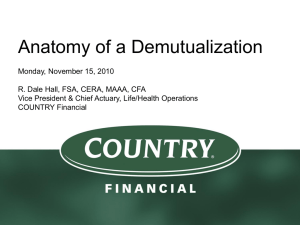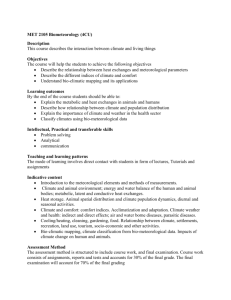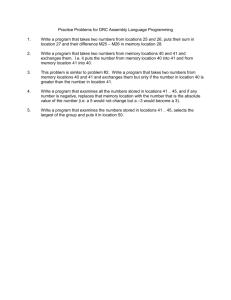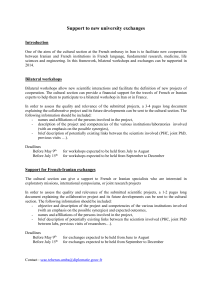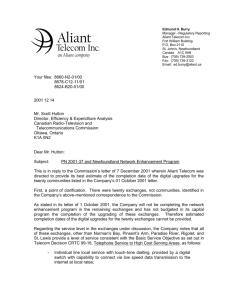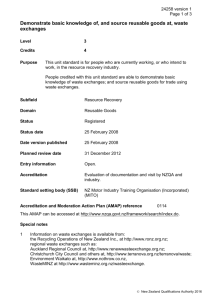Demutualising African Stock Exchanges
advertisement
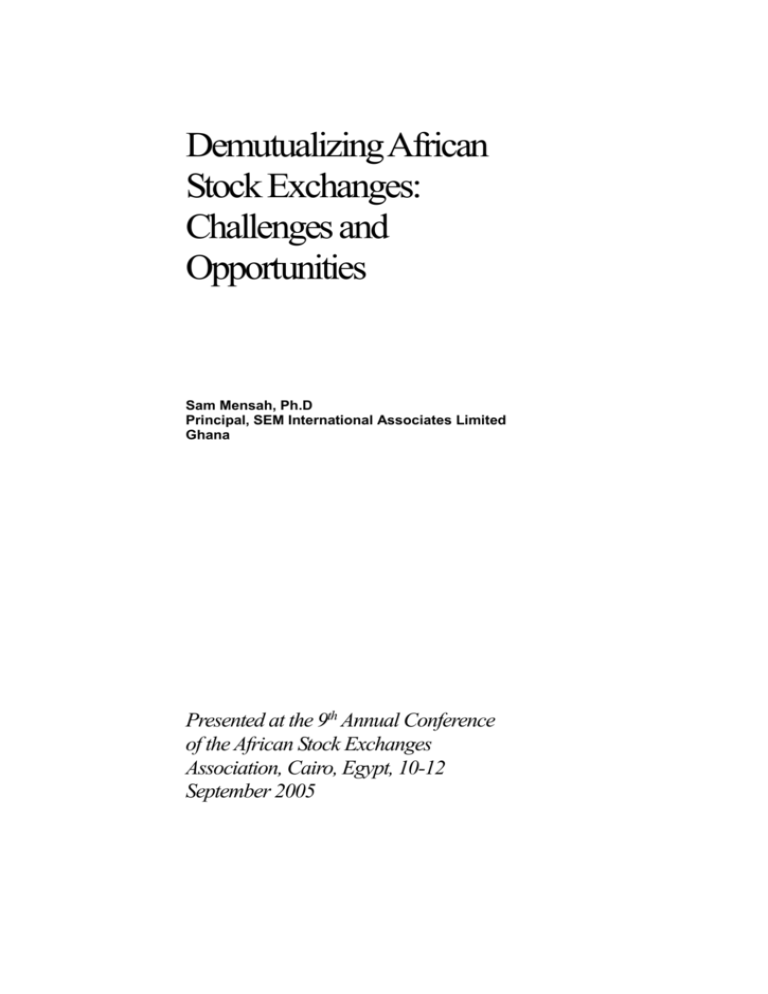
Demutualizing African Stock Exchanges: Challenges and Opportunities Sam Mensah, Ph.D Principal, SEM International Associates Limited Ghana Presented at the 9th Annual Conference of the African Stock Exchanges Association, Cairo, Egypt, 10-12 September 2005 Demutualizing African Stock Exchanges: Challenges and Opportunities INTRODUCTION This paper discusses the demutualization of stock exchanges. In particular, we wish to evaluate the factors driving demutualization and evaluate their relevance in the African context. We will then offer some views on the challenges and opportunities presented by the demutualization movement for African stock exchanges. Traditionally, the ownership structure of a stock exchange was a mutually held organization. Members enjoy rights of ownership, decision-making (one-member, one vote) and trading. Demutualization is the term that denotes the change in the legal status of a stock exchange from a mutual association with one-vote per member (and usually consensus based decision-making) to a company limited by shares with one vote per share with majority decision making. It involves the separation of trading rights and ownership. Demutualization signifies that an exchange has become a for-profit firm in a competitive financial markets environment. It has more potential for profit, and also for failure, than before and like any business, it must stand alone for its financing. In 1993, the Stockholm Stock Exchange became the first exchange to demutualize. Since then 21 exchanges in developed markets have demutualized – representing almost 40% of the membership of the World Federation of Exchanges.1 In some cases such as the Australian Stock Exchange and the London Stock Exchange, the demutualized stock exchanges have become publicly traded companies. By contrast, the pace of demutualization in emerging markets has been much slower. As at April 2005, exchange demutualizations had been completed in only 5 jurisdictions out of a total of 76 emerging market jurisdictions.2 In Africa, there are a few stock exchanges such as Mauritius and the Bourse Régionale des Valeurs Mobilières (BRVM) are limited 1 2 Source: World Federation of Exchanges Annual Report and Statistics Source: IOSCO EMC WG2 surveys. 1 by shares and in theory demutualized.3 However, there is a significant overlap between licensed stockbrokerage companies and shareholders. The demutualization fever has not caught on in Africa as compared to other emerging markets. FACTORS DRIVING DEMUTUALIZATION The demutualization trend has been that attributed to a number of reasons that include: Improved governance Investor participation Competition Globalization and consolidation Unlocking stock exchange value Improved Governance While demutualized stock exchanges will continue to provide most of the same services, they will have different governance structures in which outside shareholders are represented by boards of directors. The mutual association model functions well if an exchange is a provider of trading services with limited competition and the interests of members are homogeneous. If greater competition exists and the interests of members diverge from one another and from the exchange, the mutual governance model consensus decision-making becomes slow and cumbersome. The exchange is unable to respond quickly and decisively to changes in the market. The profit-oriented corporate model will enable management to take actions that are in the best interests of customers and the exchange itself. With the separation of ownership and trading privileges, an exchange will achieve greater independence from its members with respect to its regulatory functions. Owners’ interests will be aligned with those of the exchange - both will seek to maximize the profits of the exchange. Strategic decisions will also be made by management in a much more efficient manner. Demutualized exchanges will be forced to account to their shareholders not only regarding the bottom line, but regarding issues arising in corporate governance. Investor Participation A stock exchange must be responsive to the needs of its many stakeholders, including participating organizations, listed companies, and institutional and retail investors. Exchanges may perceive a need to shift power within the exchange from one group of members to another and to afford institutional customers direct access to exchange facilities. Separating 3 See Appendix for a table on the ownership structures of African stock exchanges 2 trading rights from ownership may be a politically and economically feasible way to effect such a shift. Unlike a mutual structure where often only broker-dealers may be members, a demutualized exchange affords both institutional investors and retail investors the opportunity to become shareholders. The assets managed by institutional investors and the trading needs of institutional investors differ dramatically from those of retail investors. A demutualized exchange will have greater flexibility to accommodate the needs of institutional investors as customers, and potentially, as owners. Competition Exchanges have lost their monopoly as the sole providers of trade execution and related services. The widespread proliferation of Alternative Trading Systems (ATS) and Electronic Communication Networks (ECN), driven by technological innovation have allowed efficient and effective matching of buy and sell orders of customers at lower transaction costs, while offering transparency, trader anonymity and extended trading hours. Large global traders are able to cross orders and only report the net position to the exchange (thus avoiding transaction costs). In the United States, the competitive edge of the ECNs is reflected in the fact that in 2002, ECNs accounted for 45% of NASDAQ shares traded (compared to 25.5% in 1999). The improvements in technology that have facilitated the ATS and ECN platforms have eroded the significance of the physical national exchange with a trading floor. Globalization and Consolidation Competitive pressures have triggered a wave of restructuring and mergers and alliances among securities markets to maximize economies of scale and scope, accessibility and market reach while providing global trading facilities. Examples of such mergers include Euronext, established by a merger of national exchanges in France, the Netherlands, Belgium and Portugal and integrated equity markets in Sweden, Finland, Denmark and Norway. NASDAQ has also developed global alliances to attract more liquidity for the United States. In Asia, several exchanges have trading links and dual listing agreements with NASDAQ. Exchanges have been pushed to demutualize as a result of global competition for order flow and the search for greater revenues. Globalization has threatened or even decimated the exclusive franchise that exchanges once enjoyed. Whereas a domestic exchange was once the only alternative for listing a particular financial product, now issuers have a variety of options. They may list on the domestic exchange, choose another exchange such as for a single listing, or have a dual listing to the advantage of both exchanges. 3 An IOSCO survey4 has found that demutualization in emerging markets has also been driven by the increasing competition for global order flow and fears about lack of liquidity and marginalization of domestic markets. With domestic issuers being provided access to multiple markets, order flow and liquidity could easily migrate to major markets. Demutualization is seen as a catalyst to transform the stock exchange business model to facilitate a more effective response to competition. Resources for Capital Investment A competitive stock exchange must be able to respond quickly to global competitive forces and technological advances. With the capital raised from an Initial Public Offer (IPO) or a private placement a stock exchange should have both the incentive and the resources to invest in the competitiveness of its information systems. To be competitive, products and services must not only be timely and cost-effective, but also reliable. The move from floors to screens has required considerable capital investment. Demutualization offers an opportunity to buy out trader interests since they are no longer necessary and shift power to other firms, while raising capital for continued modernization of trading information systems. Continued investment in technology may serve as an effective way to meet competition from ATSs and upstairs trading as well as justifying the scale of the traditional integrated exchange model. Unlocking Stock Exchange Value Demutualization provides an opportunity to unlock the value of a stock exchange though the realization of the value will ultimately depend on the listing of the exchange. In the majority of exchanges, the value of the exchange is usually distributed to member brokers. Demutualization and listing provides an exit mechanism for former brokers to sell down equity thereby broadening the shareholder vase and decoupling of broker interests from that of the exchange. Emerging Market Considerations There are some additional drivers of demutualization that seem to be peculiar to emerging markets. Some emerging market regulators view demutualization as a means of collaborating with strategic shareholders with specialized know-how with the object of importing international skills, knowledge and technical efficiencies into the domestic market. Demutualization is also seen as a means of accelerating the development of technology-related infrastructure and capabilities. There are some significant differences in the weight of the factors that drive demutualization when we compare 4 Emerging Markets Committee of the International Organization of Securities Commissions (2005), “Exchange Demutualization in Emerging Markets” 4 developed and emerging markets. For example, the threat of competition from ATS and ECN trading and the ability to raise capital have not been predominant drivers for demutualization. We should further note that the demutualization in emerging markets has been largely policy led. Typically, the process is led by either the government or the regulator. By contrast, demutualization in developed markets is generally led by the exchange or industry based on market considerations. IMPLICATIONS OF DEMUTUALIZATION It is helpful to review the issues that arise during and after demutualization in order to establish a goodness of fit between particular stock exchanges and the demutualized model. We will consider the implications of demutualization under the following headings: Regulation Financial viability Process Regulation Demutualization raises many questions about the regulation of stock exchanges: What role should government play in regulating private stock exchanges? What role should private stock exchanges play in regulating exchange activities and members? Stock exchanges usually operate as self-regulatory organizations. The self-regulatory functions usually consist of: Trading: Setting rules for trading, conducting surveillance and enforcing the rules Market manipulation: Overseeing the trading system to avoid abuses Membership: Establishing rules to govern the conduct of members and monitoring compliance with and enforcement of rules. An issue that is raised by demutualization is whether attempts to maximize profits will undermine self regulation. New regulatory models are emerging in the wake of the demutualization movement: A demutualized exchange continues to perform all of its regulatory functions even after demutualization. Concerns have been raised as to whether a demutualized exchange will take 5 enforcement actions and impose penalties on those who are major providers of revenue For-profit exchanges can establish a separate entity to conduct regulatory functions, thereby avoiding conflict-of-interest issues. Nasdaq has taken this route by creating two subsidiaries: NASD Regulation Inc, which is the regulatory arm and the Nasdaq Stock Market, the commercial trading arm, An exchange can outsource its regulation to a completely independent third party. Thus approach may help avoid the perception of conflict of interest. Inc., the US, the National Futures Association performs this function for several exchanges. However, there must be some way of ensuring that the thirds party regulator is accountable and will perform its functions effectively. To be fair, some of the conflict issues that exist under demutualization already exist with the current mutual exchanges. For example, the temptation to hurry through a lot of listings is high even for mutual exchanges because of the revenue potential. However, this might be exacerbated under demutualization because of the stronger profit motive, unless the listing approval is taken away from the exchange as obtains in the United Kingdom.5 In markets where regulatory systems are fragile, the challenge is to forge an effective relationship between the for-profit stock exchange and the regulator and to maintain investor confidence in the market. To achieve this, regulators in emerging markets have found it necessary to be a significant player in the demutualization process. Financial Viability The principal sources of revenues for exchanges are membership subscription fees, listing fees, trading charges, services fees including clearing and settlement, depository fees, etc. and charges for other activities such as company news, quote and trade data. In developed countries and larger emerging markets, stock exchanges have developed profitable operation driven by well-developed economies, market size and business strategies. However, stock exchanges in many developing countries operate at a deficit and have enjoyed financial support from government and donors or been even owned by government because they are viewed as institutions serving a national interest. The financial viability question is simply this: what happens in a country with only one major stock exchange that suddenly goes bankrupt? 5 The Financial Services Authority of the U.K. has set up the U.K. Listing Authority to independently approve listings. 6 A for-profit demutualized structure does not guarantee a profitable existence. The possibility the for-profit exchanges may fail can create serious problems if listed companies suddenly find it difficult to raise capital and investors face reduced liquidity for their holdings. Thus regulators may need to closely monitor the financial condition of demutualized stock exchanges. For example, in Australia, a reserve fund was created to provide a capital cushion. The Toronto stock Exchange provides an early warning system whereby the exchange is required to maintain certain financial rations and to notify regulators when not in compliance. Process An IOSCO survey has established that the process of demutualization has been uneven between developed and emerging markets. In emerging markets, the decision-making process is largely policy-led whole in developed markets it is market-led. Because the impact of market forces may not be at the same level as a developed market, exchange restructuring issues are considered from the perspective of national policy. Strong backing by the government is needed to resolve thorny issues such as how to allocate ownership of an exchange that was limited by guarantee prior to demutualization, and the relationship between the regulator and a demutualized exchange. In many cases recommendations on the demutualization design and the model of the new exchange are evaluated and approved by the government. For example, in Malaysia, there was a working group chaired the regulator, comprising members of the exchange, the association of stock brokers and the Capital Markets Advisor Council to facilitate the demutualization process. CONDITIONS IN AFRICA In this section, we seek to address the question as to whether demutualization is the answer for stock exchanges in Africa. In particular, we want to look at the market setting and the characteristics of African stock exchanges and assess the goodness-of-fit with the demutualized stock exchange model. Experience in the markets indicates that certain preconditions are important for successful demutualization and for demutualized stock exchanges to operate successfully: A sufficiently liberalized financial market in which a for-profit stock exchange can survive with new business strategies. For example, an insufficiently liberalized capital account may not be conducive for the creation of a for-profit exchange as these controls could inhibit the ability of a commercialized exchange to 7 implement business strategies including he implementation f cross-border strategies. A market justification reflected in a critical mass of trading activity that supports the financial viability of the exchange Support of the government in managing the conflicting demands of various stakeholders in the demutualization process and in expediting the process of regulatory changes and approval. Table 1 provides a listing of African stock markets covered by Standard & Poor’s Global Markets. In addition there is a market in Mozambique and Cameroon has just established a stock exchange in Douala, bringing the total number of African stock exchanges to 20. African stock exchanges have been described as small, illiquid and poorly regulated. Internationally, most African markets are classified as “frontier markets” in contradistinction to “emerging markets”. The classification is somewhat arbitrary but South Africa and Egypt as usually classified as “emerging”.6 TABLE 1: AFRICAN STOCK MARKET Market Capitalization (US$ millions) Botswana 2,131 BRVM 1,650 Egypt 27,073 Ghana 1,426 Kenya 4,178 Malawi Mauritius 1,955 Morocco 13,152 Mozambique Namibia 308 Nigeria 9,494 South Africa 267,745 Swaziland 172 Tanzania Tunisia 2,464 Uganda Zambia 768 Zimbabwe 4,975 STATISTICS (2003) MKT Market CAP/GDP* Listed Turnover (%) Companies (%) 14.2 19 4.4 6.6 38 1.6 10.1 967 13.7 3.1 25 4.1 12.6 51 7.4 0.0 8 14.2 40 6.2 10.9 53 6.5 0.0 2.5 13 0.7 6.6 200 11.0 56.5 426 44.8 3.3 5 0.0 4 3.5 46 7.2 0.0 8.4 11 1.46 16.4 81 26.1 Others United States 14266266 130.6 5,295 United Kingdom 4212434 261.5 2,311 Singapore 145117 139.5 475 Malaysia 168376 71.4 897 India 6 The Economist magazine publishes 279033 9.1 5,644 weekly economic data for emerging markets. The only African countries covered in this list are South Africa and Egypt. Source: Standard & Poor's: Global Stock Markets Factbook, 2004 8 * GDP is is Purchasing Power Parity GDP, World Development Indicators Database, World Bank, April 2005 122.8 100.6 71.1 34.3 138.5 From Table 1, we can make the following observations: 1. African stock markets are small by international and developing country standards. Market capitalization to GDP is as low as 3% in Swaziland Excluding outliers such as South Africa, market capitalization to GDP levels off at about 14%. This is in contrast to market capitalization to GDP ratios in advanced countries which range from such as the 262% and 131% in the U.K. and USA respectively and in other emerging markets such as Malaysia with a market capitalization to GDP ratio of 71%. The low ratio of market capitalization to GDP suggests that stock markets in Africa play relatively limited roles in their domestic economies. 2. Liquidity as measured by turnover is low. Markets such as Ghana have turnover ratios as low as 4.1%. Even South Africa, the largest and most liquid market in Africa has a turnover ratio of 44.8%. This contrasts with turnover ratios of over 100% in developed markets and in other emerging markets such as India with a turnover of 138.5%. 3. The number of listed companies is very low for most countries. Egypt and South Africa are obvious outliers with listings of 967 and 426 respectively. Some countries such as Tanzania have as few as 4 listed companies although there are countries such as Nigeria, Zimbabwe and Kenya and Morocco with over 50 listings. The limited number of listings creates supply constraints and contributes to the observed illiquidity of African markets. The statistics do not tell the full story of the peculiar characteristics of African stock markets that are relevant for evaluating the demutualization option. One significant characteristic of African stock exchanges is the significant preponderance of listings by local subsidiaries of multinationals. Examples include multinational banks such as Standard Chartered Bank and Barclays Bank and global manufacturers such as Unilever. While the parent multinational may be cross-listed in a number of developed markets, the subsidiary listing is “domesticated”. This implies that there is no incentive for the listed local subsidiaries to migrate. Added to the fact that the listed domestic companies are usually too small to migrate or cross list on advanced markets, African markets are not subject to the international competition for order flow. 9 The performance of African stock exchanges has been mixed. The factors that have been identified as impeding the performance of African stock markets are also relevant for evaluating the readiness of a stock exchange in Africa to demutualize. The literature7 cites the following performance limitations: The Macroeconomic Setting: Many African economies are still characterized by high fiscal deficits, high and volatile inflation, volatile and fast depreciating exchange rates and high interest rates. Policy inconsistency and macroeconomic instability undermine investor and issuer confidence, thus dampening business flow to stock exchanges. .Regulatory Framework:. Most African capital markets lack a robust regulatory framework. This is not because of a lack of laws, rules or a regulatory agency. A survey of African capital markets indicates that out of 19 markets, 15 of them have a formal supervisory authority. There are laws in place to regulate the securities markets while every stock exchange has a comprehensive set of rules for members and for listings. “The real challenge is the shortage of experienced supervisors and the absence of a strong tradition favoring compliance with the rules and discouraging regulatory forbearance”[Vittas (1998)].8 Poor regulatory enforcement will create challenges in an environment with a demutualized stock exchange given the inherent conflict-of-interest in demutualized structures. Market Infrastructure: The smallness of African capital markets means that usually resources are unavailable for the acquisition of key infrastructure needed for market operations. In most African markets, the state of the art in market infrastructure still lags established technology and norms. For example, as many as 8 African securities markets do not have a central securities depository. In theory this should be a positive driver for demutualization because of better ability of a demutualized stock exchange to raise capital. However, in practice this advantage of demutualization is constrained by the limited profitability prospects of African stock exchanges. 7 See for example, Sam Mensah and Todd Moss (eds.) African Emerging Markets: Contemporary Issues, Vol 2, Accra, Ghana: African Capital Markets Forum, 2004 8 Dimitri Vittas, “Institutional Investors and Securities Markets: Which Comes First?, World Bank Working paper 2032, December 1998 10 The Human Resource Base: In more developed countries, a large part of the training in capital markets is commonly on the job. Working in a market economy and liberalized financial markets requires fundamentally different skills than working in a command-type economy. Given that many African countries had administered financial systems in the part, training. With regard to demutualization, exchange management, having previously operated mostly in a regulatory mode might find it difficult to assimilate commercial mindset or develop the necessary capacity to execute sound business strategies. The Investor Base: African markets are characterized by a small investor base. This is because the majority of people in these countries are unable to save or invest. According to a report from the United Nations Conference on Trade and Development (UNCTAD), almost nine out of 10 people in Africa’s poorest countries live on less than two dollars a day, and two-thirds survive on less than one dollar a day. There is a similarly low base of institutional investors. The limited investor base has implications for the financial viability of a demutualized exchange. In order to appreciate how the demutualization movement is likely to play out in Africa, it is important to understand the reasons that led to the establishment of stock exchanges in Africa. With the exception of older stock exchanges such as South Africa, Kenya, Egypt, Zimbabwe and Nigeria, African stock exchanges have been set up as government initiatives. Many African stock exchanges benefit from direct and indirect government subsidies in order to cover their operating expenses. According to Moss (2003)9, the reasons for the high propensity of African governments to promote stock exchanges are both “technocratic” and “political”. The technocratic reasons are the standard economic reasons normally advanced by technocrats to justify formal capital markets such as a source of long-term finance, improved capital allocation, savings mobilization: and improved corporate governance. However there is also a complex mix of noneconomic factors which underpin government objectives for promoting stock exchanges. These noneconomic factors are generally inconsistent with the market reasons for demutualizing. Moss has identified the following: Emerging Market Fever: According to Moss: “Africa has historically been prone to following, 9 Todd Moss Adventure Capitalism: Globalization and the Political Economy of Stock Markets in Africa, (Ashgate Publishers, Hampshire, UK, 2003 11 sometimes with quite forcible external encouragement, development trends as they swing from one idea to the next” (Moss, p41). Changes in global investment trends during the 1990s saw significant flows of global capital to emerging markets of Asia and Latin America. While Africa’s share was relatively small, African governments justifiably felt the need to adopt institutional structures that would help them compete for their share of global portfolio flows. The stock exchange was a ready made institutional import in support of this cause. A Badge of Inclusion: The liberalization of African economies which started through the structural adjustment programs of the 1980s shifted attention to the private sector in Africa, which was touted as “the engine of growth”. As a symbol of international legitimacy, the stock exchange was ideal. It was a highly visible symbol of the free enterprise credentials of a country. Presidents and prime ministers found it appealing to stress the modernity of their economies by showcasing their stock exchanges in investment promotion speeches around the world. Geography: In some cases stock exchanges have emerged as a result of geography. The BRVM was established as a regional stock exchange for the eight West African countries belonging to UEMOEA. Prior to its establishment, the only stock exchange in the zone was in Code d’Ivoire. It was natural for the regional exchange to be established in Abidjan to build on the existing exchange. Whether current efforts at regional integration of capital markets in Africa will succeed will be very much a function of the geographical appeal of the location of the regional market. Populist Symbolism: Governments have been searching for ways of “democratizing” the ownership of wealth in the economy. Popular ownership of shares is appealing, particularly as a means of deflecting criticisms of privatization drives. Privatization through stock exchanges is seen as transparent and fair as well as supporting a narrowing of the income gap. Stock exchanges can also be used as tools for indigenization especially in cases where there is widespread discontent about foreign ownership in the economy. 12 Politics of Economic Reform: Financial sector reform features prominently in the programs of donors. Countries seen to be making progress in reforming their financial sectors, including the capital market are likely to receive high allocations of aid from donors. Major donors such as USAID and SIDA have financial intermediation projects. The IFC provided seed money for the Ghana Stock Exchange and the BRVM while SIDA has supported Tanzania, Uganda and Zambia. The existence of these non economic factors mean that in most cases, demutualization is unlikely to be driven by the economics of an exchange. Government policy will be critical in African demutualization and in many cases as long as the stock exchange fulfils its national policy role, demutualization is unlikely to be a priority. There are good reasons for African Stock exchanges to demutualize. From our discussion of the factors that drive demutualization, the factors that drive demutualization that may be equally relevant in Africa are: Improved governance Investor participation However, most African stock exchanges are not subject to the competition that is faced by stock exchanges in advanced markets. The reason is that the advanced markets are much more integrated with the global financial markets and operate within very high technological environments that expose them to competition from alternative trading systems. By contrast, African stock exchanges have domestic monopolies in their countries and serve primarily domestic issuers who are not able to access global financial markets. The justification of demutualization in terms of the mobilization of resources for investment and the unlocking of stock exchange value rests on the assumption that stock exchange will be profitable, at least in the medium term. While in principle demutualization should allow a stock exchange better access to finance, the size of African stock markets make this unlikely. With the possible exception of Egypt, Nigeria, Kenya, and Mauritius, African stock markets operate below breakeven because of their small sizes. Thus, demutualization is unlikely to result in more resources. Given the strong correlation between stock market growth and growth in the larger economy, the journey towards financial self-sufficiency is likely to be long. Having reviewed the relevance of the drivers of demutualization in the African context, we make the following 13 observations with regard to the earlier mentioned preconditions for demutualization: Financial markets in Africa are still not sufficiently liberalized to enable a for-profit stock exchange top explore an expanded opportunity set. For example, markets such as Ghana still have capital account restrictions that limit the ability of a stock exchange to implement cross border strategies such as cross listing. Of the 20 stock exchanges in Africa, only about 7 are likely to be financially viable. In my unscientific view, these are the stock exchanges with a combined market capitalization of at least $2 billion and at least 40 listings. I see Egypt, Kenya, Mauritius, Morocco, Nigeria, South Africa and Zimbabwe as possibly having such critical mass. While government support for demutualization is likely to be forthcoming in cases where a market case can be made, African governments may not be in a hurry to demutualize stock exchanges, especially in cases where they still provide financial support to the exchange. Furthermore, as long as exchanges as in their current mutual form meet national policy objectives, African governments will continue to provide financial support although the usual underfunding and erratic disbursement will continue. Summary and Conclusion In summary, African stock exchanges should move cautiously on demutualization. The factors that have fueled demutualization in developed and the larger emerging markets are largely absent from Africa. In addition, the key preconditions such as a sufficiently liberalized market and critical mass of stock exchange trading and related services do not exist in most markets. Having sounded this note of caution, I hasten to add that there are a minority of African stock exchanges that are likely to meet the various tests of readiness for demutualization. In my view, these are the larger stock exchanges with market capitalization and listings that are adequate to sustain profitable operations upon demutualization and whose markets are currently sufficiently liberalized. Demutualization does not have to be an “all-or-nothing” model. Stock exchanges that do not have the necessary preconditions for demutualization at this time should consider demutualization as a long-run objective. In the transition 14 period, which may be long for many exchanges in Africa, some of the touted benefits of demutualization can be partially captured as follows: Mutual stock exchanges can improve their corporate governance by reducing the representation of members and government in favor of external experts and other stakeholders such as institutional and retail investors. To the extent that resources are available, stock exchanges should continue to improve their trading and post-trade technology so that they can remain competitive and avoid possible migration of liquidity as companies mature on their exchanges. Ongoing market liberalization such as a managed current account liberalization will enhance the prospects of the demutualized stock exchange. Finally, African stock exchanges should avoid pressure from donors to demutualize. As we know, donors tend to move from one fad to another. Already, some donors have proposed demutualization as a condition for funding. African stock exchanges should seize control of the demutualization agenda and only move when the objective conditions are right. 15 Appendix: Ownership Characteristics of African Stock Exchanges Country Botswana Ownership Characteristics BRVM Egypt Ghana Kenya Mauritius Namibia Nigeria South Africa Tanzania Zimbabwe Established by statute (Botswana Stock Exchange Act, 1994) as body corporate Statutory body Committee of Botswana Stock Exchange manages exchange 3 members appointed by Minister of Finance 2-6 elected from membership of stock exchange Private corporation 13.5% owned by the West African Economic and Monetary Union (WAEMU) Remainder distributed among brokerage firms, chambers of commerce and industry, subregional institutions and other private institutions or WAEMU companies Mutual; Member-based Company limited by guarantee Member owned Registered under the Companies Act in 1991 as a company limited by guarantee Shareholder owned Trading membership separate from ownership not for profit comprises 43 associate members (banks, listed companies, investment institutions, etc.) Executive Committee of nine members of the business community, representing different business sectors, and the tenth member represents(Namibia Financial Institutions Supervisory Authority, Regulated by the Stock Exchanges Control Act (1985, amended 1992) Limited by guarantee Mutual, member based Mutual, member based Incorporated in September 1996 as a private company limited by guarantee and not having a share capital under the Companies Ordinance (Cap. 212). The ZSE is regulated by the Zimbabwe Stock Exchange Act Chapter 24:18 of 1996. It operates under the supervision of a nine member Committee comprising of 2 members appointed by the Minister of Finance and not less than 4 and not more than 7 members elected from within the stock broking fraternity. 16 17
